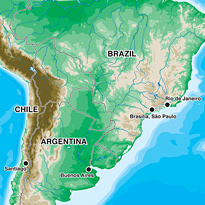The role of IU’s International Affairs in partnership development
IU’s Office of the Vice President for International Affairs (OVPIA) coordinates the majority of Presidential trips abroad, assisted by the IU Alumni Association to plan events for alumni in selected cities that the President will be visiting. Since the trips typically involve meetings with university administrators, ambassadors, and other public and private sector officials, OVPIA staff begin the complex work of building a schedule that advances IU’s strategic international goals and objectives. In many cases, this entails multiple meetings with faculty across the IU system to assess interest in new and existing partnerships in the target countries, months of negotiation on new university-to-university partnership agreements, and finally logistical juggling to accommodate all of the necessary meetings in a tight timeframe. With such small windows of time available for international travel, it is essential that the itinerary maximize the President’s opportunities to meet with key constituents.
Because the Presidential travel schedule each year is limited, OVPIA staff often arrive early or extend their trip a few days after the departure of the President back to the U.S. On this particular trip, Vice President David Zaret visited the southern Brazilian city of Porto Alegre in the State of Rio Grande do Sul, Indiana’s sister state.
The visit included a meeting with a dozen faculty members of the Federal University of Rio Grande do Sul (UFRGS). Among Brazil’s top-ranked federal universities, UFRGS has expressed interest in several areas of collaboration, including health management, public health and epidemiology, leadership development, entrepreneurship, informatics, computing, and international studies. To provide some perspective on the partnership development process, the conversation about this potential collaboration began during my visit to UFRGS in April, and over the subsequent months, I continued to correspond with colleagues both in international affairs and in academic units to define in greater detail the parameters of our follow-up meeting. With concrete next steps defined in that meeting, OVPIA now has one of the more challenging tasks: connecting the appropriate faculty members at IU and UFRGS to determine if collaboration – on research, teaching, institutional development projects, or other activities – is possible. This part of the partnership development process can take months, sometimes years, and requires significant, continuous communication with the parties as specific areas of collaboration emerge.
Beyond the meeting with UFRGS, the Partners of the Americas office in Indianapolis facilitated some additional meetings significant for both IU and the State of Indiana. One such meeting was with Parceiros Voluntarios, a non-profit agency that works closely with volunteer organizations throughout Rio Grande do Sul (in more than 50 cities across the sprawling state) to build their internal leadership capacity, improve their operational effectiveness, and strengthen their ability to recruit and retain volunteers. A representative of Parceiros Voluntarios will participate in one of the IU School of Philanthropy‘s seminars in early 2013, and IU sees a potential collaboration with the agency for purposes of academic research and experiential learning opportunities for students.
With two and a half days of meetings in Porto Alegre, OVPIA was already busy in Brazil, before the arrival of President McRobbie, to push forward with the important foundational work necessary to open the door to new and exciting opportunities.


